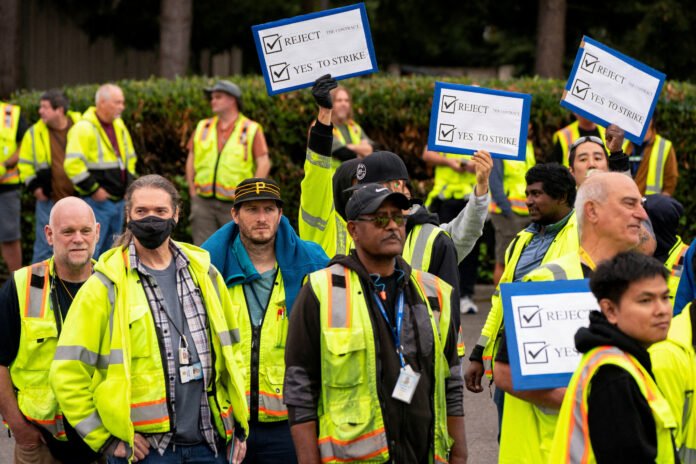Thousands of Boeing workers in the United States began a strike after rejecting the company’s contract offer. Around 3,200 union members walked off the job at midnight following a vote against the proposal.
The strike involves members of the International Association of Machinists and Aerospace Workers. They work at Boeing facilities in Missouri and Illinois. These workers build and maintain advanced military aircraft like the F-15 and F/A-18.
The union held a vote after reviewing Boeing’s latest four-year contract proposal. Most members rejected it, citing concerns over job security, pay, and scheduling flexibility. Union leaders said workers want a deal that protects their families and rewards their experience.
Sam Cicinelli, Vice President of IAM’s Midwest Territory, voiced strong support for the workers. He said the team behind the jets plays a vital role in national defense. According to him, they deserve a contract that reflects their contribution.
Union officials also stated that this strike reflects years of growing tension. Workers have consistently demanded improved conditions, better schedules, and stronger long-term benefits. Many believe Boeing failed to meet these expectations.
Boeing responded by highlighting the proposal’s generous terms. The company said the offer included an average 40% wage increase. Executives also claimed the deal addressed workers’ concerns about alternative work schedules.
However, the union rejected the terms and chose to initiate the strike. Now, production and maintenance at key Boeing defense sites are disrupted. The affected facilities include locations in St. Louis and St. Charles, Missouri, and Mascoutah, Illinois.
Boeing has implemented a contingency plan to limit operational impact. Non-striking staff will continue supporting ongoing defense programs. Nevertheless, industry analysts say delays in military production could occur if the strike extends.
This labor action comes at a time when Boeing is under pressure from various fronts. Commercial jet orders face delays, while defense divisions experience workforce unrest. Moreover, competition from rival defense contractors continues to increase.
The Boeing workers’ strike adds more uncertainty to the company’s long-term planning. It also puts pressure on management to resolve disputes without harming defense capabilities. National security projects, including fighter jet upgrades, may face setbacks if the dispute continues.
Negotiations between Boeing and union leaders could resume soon. Yet, workers insist that any agreement must provide meaningful changes. Until then, the Boeing workers’ strike remains a major challenge for the aerospace giant.
For more business updates, visit DC Brief.


